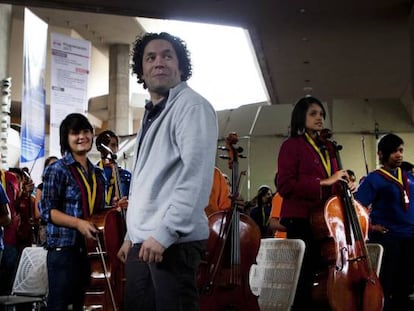Venezuelan violinist Wuilly Arteaga vows to fight Maduro with music
Beaten and imprisoned for performing during opposition protests, musician says he has no plans to stop

During his time in detention in July, Venezuelan violinist Wuilly Arteaga says he was beaten and his instruments smashed. But as the 23-year-old tells EL PA?S, he refuses to be intimidated and will keep up his opposition to the regime of Nicol¨¢s Maduro: ¡°I¡¯ll continue fighting in the streets with my violin.¡±

He has since recovered from the beatings and abuse he suffered at the hands of the paramilitary Bolivarian National Guard in Caracas after he was picked up on July 27 and accused of possessing weapons, inciting disorder and conspiring to commit a crime.
But as soon as he felt well enough, he began performing again in the streets and squares of the capital, as well as in the homes of fellow prisoners ¨C to provide encouragement to their families and fulfill a promise he made to them while imprisoned to continue the fight against Maduro and to return Venezuela to democracy.
I think the world knows that Venezuela is no longer a democracy Wuilly Arteaga
Arteaga denies he admitted guilt while in detention. ¡°They¡¯ve?distributed a video that puts words in my mouth ¨C things that I never said. In Con el mazo dando??[roughly translated as ¡°Praise the Lord and pass the ammunition¡±], a government television program. They engineered my voice to deliver sentence after sentence, saying that I¡¯m sorry for what I did and that I recognize the authority of Maduro. I will tell all Venezuelans that the real facts are worth far more than the words in that fake video.¡±
Artega came to Caracas from his hometown of Valencia, in northern Venezuela, where he taught himself to play the violin. ¡°I watched videos of Hilary Hahn and then luckily found my way into the core of El Sistema [a publicly financed music program founded in 1975 ]¡± he says. He quickly rose through the ranks, but grew disenchanted on a number of issues: ¡°We had to play for the government.¡±
They distributed a video putting words in my mouth, things that I never said Wuilly Arteaga
So the musician moved to Venezuela¡¯s capital with his violin, playing on the streets and the subway. Little by little, he joined the protests ¨C with music. ¡°At first, I thought it would bother the others, but I discovered that I was effective with my violin,¡± he says. The strange thing is that it also seemed to calm the spirits of the forces charged with suppressing the demonstrations. ¡°I would pay close attention to them and notice their expressions. Sometimes, I could see them feeling remorse, with tears in their eyes.¡±
But one day, police officers tried to wrest the violin from his hands: ¡°I clung to it, and they dragged me. I did not want to let go.¡± It was his first warning. The instrument was smashed, but replacements soon arrived. Among them, one that he received during a visit to Washington that had belonged to Armando Ca?izales, a 17-year-old violinist who was shot by security forces. This violin, too, was confiscated.
Arteaga says he is determined to recover the instrument. ¡°I¡¯m going to demand that I get it back. It has his [ Ca?izales¡¯s] name etched on it,¡± he says.
While in detention, and without his violin, Wuilly sang:? ¡°to the prisoners and to the guards. Songs that touch us all: Alma llanera, Venezuela, our national anthem, always serves to unite, never to divide. At first, the guards told me to be quiet, but they came to like and even encourage my singing,¡± he confesses.
While in detention, Arteaga sang to the guards, who eventually encouraged him
He later appeared in court where he faced criminal charges related to his playing of violin in public. On August 16, he was released with a warning to stop using his music to protest. He says he will continue opposing the government the only way he knows how. ¡°I think the world knows that Venezuela is no longer a democracy. They started stealing from us 18 years ago, when [former president Hugo] Ch¨¢vez came to power. There is no way out of this mess other than through pressure from the streets. This kind of protest is the only way we have to show the world that we don¡¯t recognize the government or the current system. What will happen, I don¡¯t know. But I am certain that the fight will continue.¡±
English version by Henry Hahn.
Tu suscripci¨®n se est¨¢ usando en otro dispositivo
?Quieres a?adir otro usuario a tu suscripci¨®n?
Si contin¨²as leyendo en este dispositivo, no se podr¨¢ leer en el otro.
FlechaTu suscripci¨®n se est¨¢ usando en otro dispositivo y solo puedes acceder a EL PA?S desde un dispositivo a la vez.
Si quieres compartir tu cuenta, cambia tu suscripci¨®n a la modalidad Premium, as¨ª podr¨¢s a?adir otro usuario. Cada uno acceder¨¢ con su propia cuenta de email, lo que os permitir¨¢ personalizar vuestra experiencia en EL PA?S.
En el caso de no saber qui¨¦n est¨¢ usando tu cuenta, te recomendamos cambiar tu contrase?a aqu¨ª.
Si decides continuar compartiendo tu cuenta, este mensaje se mostrar¨¢ en tu dispositivo y en el de la otra persona que est¨¢ usando tu cuenta de forma indefinida, afectando a tu experiencia de lectura. Puedes consultar aqu¨ª los t¨¦rminos y condiciones de la suscripci¨®n digital.










































